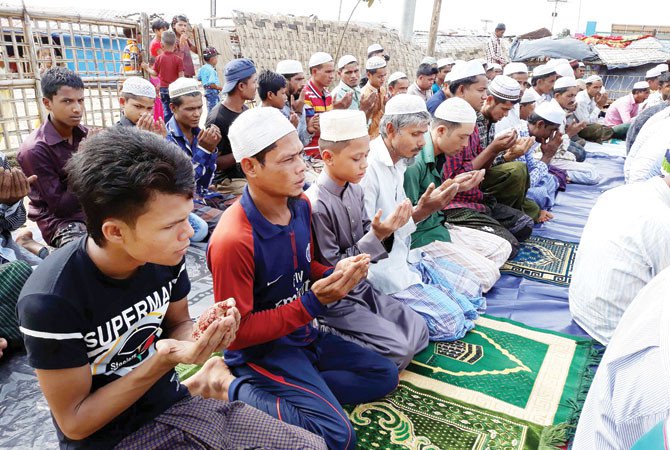Eid brings no joy to Rohingya refugees
Shehab
Sumon, Arab News, 16 June 2018
Rohingya
refugees held prayers in over 500 small mosques in squalid camps. Eid is
supposed to be a happy occasion, but the malnourished children in the camps
look gloomy
refugees held prayers in over 500 small mosques in squalid camps. Eid is
supposed to be a happy occasion, but the malnourished children in the camps
look gloomy
 |
| Rohingya Muslims offer Eid Al-Fitr prayers at a camp mosque in Kutupalong refugee camp in Cox’s Bazar, Bangladesh on Saturday. AFP |
DHAKA:
More than 1 million Rohingya refugees in Cox’s Bazar, Bangladesh, observed Eid
Al-Fitr on Saturday.
More than 1 million Rohingya refugees in Cox’s Bazar, Bangladesh, observed Eid
Al-Fitr on Saturday.
They
performed Eid prayers in more than 500 small mosques in squalid camps, offering
a special prayer for an end to their plight.
performed Eid prayers in more than 500 small mosques in squalid camps, offering
a special prayer for an end to their plight.
“It’s a
very sunny Eid day in Cox’s Bazar, but we can’t enjoy this moment,” said Iman
Ali, a refugee in Kutupalang camp.
very sunny Eid day in Cox’s Bazar, but we can’t enjoy this moment,” said Iman
Ali, a refugee in Kutupalang camp.
“Last Eid
(in Myanmar’s Rakhine state), I gave new clothes to all my family members and
close relatives, but this year it became very tough to get new clothes for my
three children.”
(in Myanmar’s Rakhine state), I gave new clothes to all my family members and
close relatives, but this year it became very tough to get new clothes for my
three children.”
Morium
Begum, a refugee in Balukhali camp, could not hold back her tears as this Eid
reminded her of happier times in
Begum, a refugee in Balukhali camp, could not hold back her tears as this Eid
reminded her of happier times in
Her
husband Joinal Abedin, who was a businessman, was shot dead last September,
allegedly by the Myanmar army, prompting her to flee to Bangladesh with her
five children.
husband Joinal Abedin, who was a businessman, was shot dead last September,
allegedly by the Myanmar army, prompting her to flee to Bangladesh with her
five children.
“This
year, my life is fully dependent on relief and aid,” said Begum. “I don’t want
the next Eid in a camp. I wish to go back home with my full rights and
dignity.”
year, my life is fully dependent on relief and aid,” said Begum. “I don’t want
the next Eid in a camp. I wish to go back home with my full rights and
dignity.”
Eid is
supposed to be a happy occasion, but the malnourished children in the camps
look gloomy.
supposed to be a happy occasion, but the malnourished children in the camps
look gloomy.
“My
father managed only three pieces of new clothes for my three brothers and
sister. He couldn’t buy anything for himself or my mother,” said Ekhlas Miah, a
child in Balukhali.
father managed only three pieces of new clothes for my three brothers and
sister. He couldn’t buy anything for himself or my mother,” said Ekhlas Miah, a
child in Balukhali.
“Last Eid
was a happy moment for our family. My maternal uncles and grandparents visited
us. I got precious gifts from my uncles.”
was a happy moment for our family. My maternal uncles and grandparents visited
us. I got precious gifts from my uncles.”
Shahana
Akhter, another child in Balukhali, said she feels no joy this Eid, which would
normally mean lots of new clothes and delicious food.
Akhter, another child in Balukhali, said she feels no joy this Eid, which would
normally mean lots of new clothes and delicious food.
She lost
her father in Rakhine last October, and fled with her mother and younger
brother to Bangladesh.
her father in Rakhine last October, and fled with her mother and younger
brother to Bangladesh.
“Last
night, I noticed my mother weeping because she couldn’t buy new clothes for me
or my brother this Eid,” said Akhter. “We want to go back home. This isn’t a
life in a refugee camp.”
night, I noticed my mother weeping because she couldn’t buy new clothes for me
or my brother this Eid,” said Akhter. “We want to go back home. This isn’t a
life in a refugee camp.”


